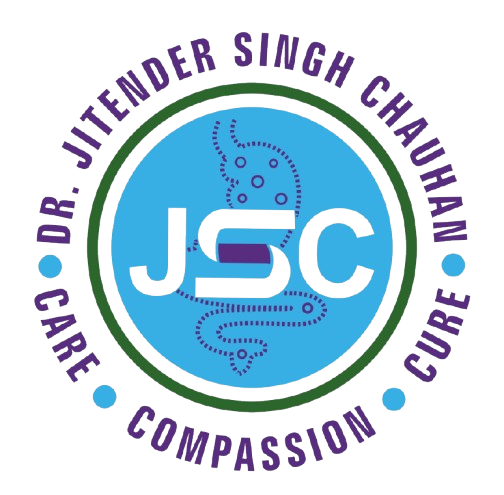Dr. Jitender Singh Chauhan
Best Onco Surgeon in Haryana
This is where Dr. Jitender Singh Chauhan steps in as one of the most trusted Gastro Surgeons and Oncology experts in Haryana, with over 15 years of experience in treating various complex gastrointestinal and oncological conditions. Dr. Jitender Singh Chauhan stands out among other specialists in Haryana due to his extensive training, compassionate care, and dedication to providing the best surgical outcomes for his patients.
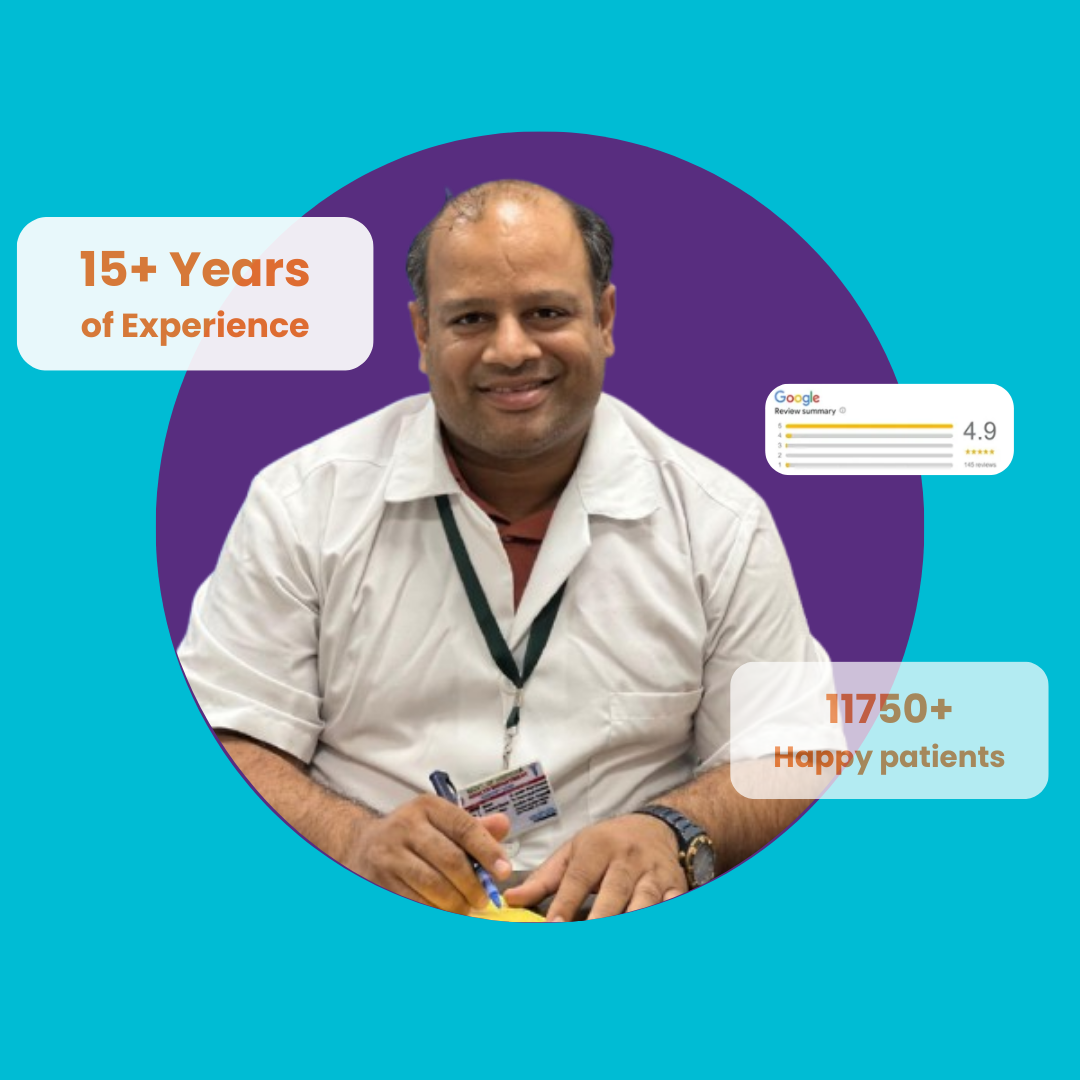
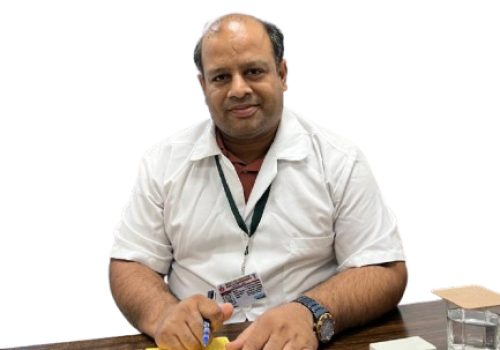
Dr. Jitender Singh Chauhan
Dr Jitender Singh chauhan is the leading liver cancer specialist in India. He has treated hundreds of patients with liver cancers. He has more than 15+ years of experience in treating liver cancer.
Management of liver cancer involves proper diagnosis & early treatment. Diagnosis is performed with Triple phase CT scan & AFP level. The treatment involves surgery, chemotherapy, TACE, TARE or RFA.
Trusted Name
11500+ satisfied patients
Rich Experience
Having 15+ years of experience
Safe Surgical Hands
1000+ successful operations performed
Dr. Jitender Singh Chauhan experience as a pancreatic cancer doctor
Dr. Jitender Singh Chauhan, a highly experienced and skilled GI cancer specialist and surgical oncologist, is based in Ambala Cantt, Haryana, India. Known for his exceptional surgical precision and compassionate patient care, Dr. Chauhan has established himself as a leading expert in gastrointestinal cancer surgeries. His expertise spans across treating complex cases involving liver, stomach, pancreas, and colorectal cancers, positioning him as one of the top oncologists in the region.
Dr. Jitender Singh Chauhan is recognized not only as a leading GI cancer specialist in Ambala Cantt, Haryana but also across the state and beyond. Known for his exceptional surgical precision, Dr. Chauhan’s expertise spans a wide array of advanced surgical techniques, tailored to achieve the best possible outcomes for patients with complex gastrointestinal cancers. His commitment to innovation and patient care ensures that his approach is both cutting-edge and minimally invasive.
Dr. Jitender Singh Chauhan’s pioneering contributions in gastrointestinal cancer surgery have established him as a leader in the field, particularly across Haryana and India. His innovative approaches to surgical interventions, combined with his vast expertise in complex GI cancer surgeries, position him as a preferred choice for individuals seeking advanced and compassionate cancer care.
Know about Pancreatic Cancer
Pancreatic cancer can be broadly categorized into two main types:

Exocrine Pancreatic Cancer: This is the most common type, accounting for around 95% of all pancreatic cancer cases. It develops in the exocrine cells of the pancreas, which are responsible for producing enzymes that aid in digestion. The most common form of exocrine pancreatic cancer is pancreatic adenocarcinoma.
Endocrine Pancreatic Cancer: Also known as neuroendocrine tumors or islet cell tumors, this type of pancreatic cancer originates in the endocrine cells of the pancreas. These cells produce hormones that regulate various bodily functions. Endocrine pancreatic cancer is relatively rare, comprising about 5% of pancreatic cancer cases.
Symptoms can be caused by various conditions include:
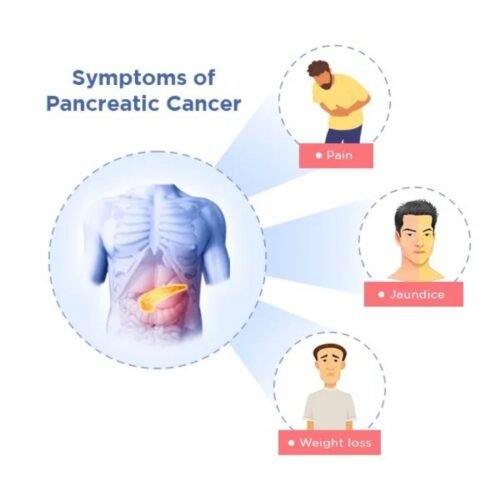
⦿ Abdominal pain: Often starts in the upper abdomen and radiates to the back.
⦿ Jaundice: Yellowing of skin and eyes due to bile duct obstruction.
⦿ Unexplained weight loss: Rapid and unintended weight loss is common.
⦿ Loss of appetite: Decreased desire to eat is a noticeable symptom.
⦿ Fatigue: Generalized weakness and tiredness may be experienced.
⦿ Digestive issues: Changes in bowel habits or floating, pale stools.
⦿ Nausea and vomiting: Digestive disruptions can lead to these symptoms.
Causes of pancreatic cancer:
⦿ Genetic mutations: Inherited or acquired mutations play a key role.
⦿ Age and gender: Risk increases with age; slightly higher in men.
⦿ Smoking: Major lifestyle factor linked to pancreatic cancer.
⦿ Chronic pancreatitis: Long-term inflammation elevates risk.
⦿ Diabetes: People with long-standing diabetes face higher susceptibility.
⦿ Family history: Increased risk if close relatives had pancreatic cancer.
⦿ Obesity: Obesity and excess body weight contribute to higher risk.
⦿ Dietary factors: High intake of red meat and processed meats may play a role.
Tests for the Pancreatic Cancer:
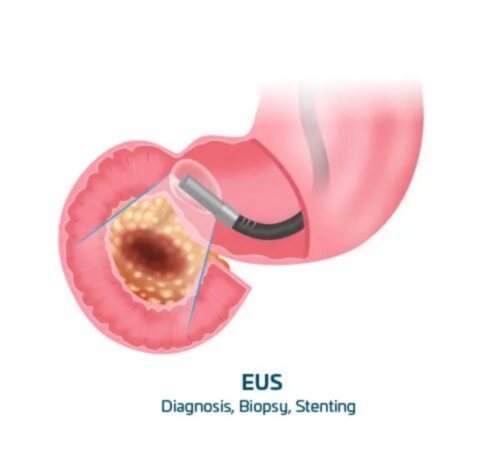
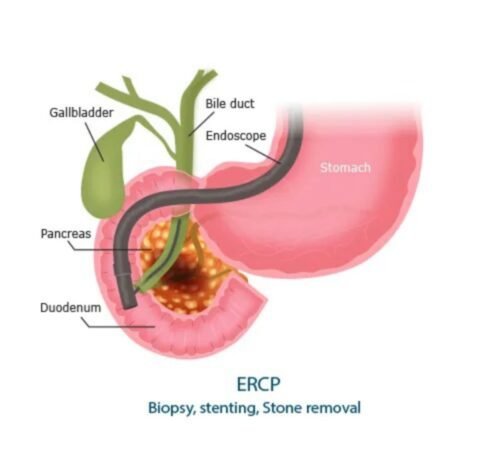
Pancreatic cancer is staged based on the extent of the disease. The stages of pancreatic cancer are as follows:
Stage 0: Also known as carcinoma in situ, cancer is confined to the top layers of cells in the pancreas and has not spread deeper.
Stage I: Cancer is localized to the pancreas and has not spread to nearby lymph nodes or distant sites.
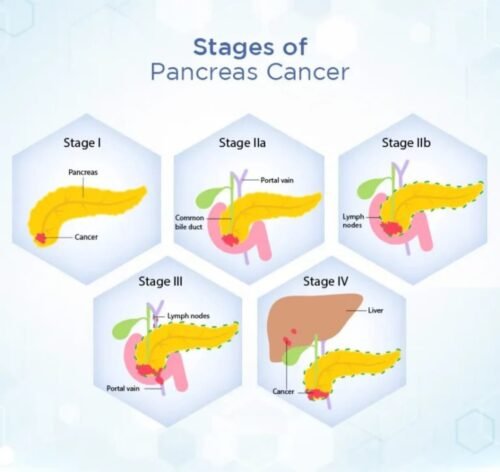
Stage II: Cancer has spread to nearby lymph nodes but not to distant sites.
Stage III: Cancer has spread to major blood vessels near the pancreas or to nearby lymph nodes.
Stage IV: Cancer has spread to distant organs, such as the liver, lungs, or distant lymph nodes.
Staging for pancreatic cancer
CT scan: A CT scan, also known as a computed tomography scan, is a medical imaging technique that uses X-rays and computer processing to create detailed cross-sectional images of the body.
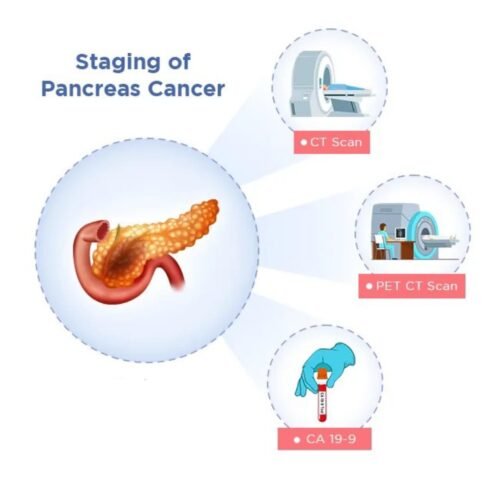
Treatment options for pancreatic cancer
⦿ Chemotherapy: Powerful drugs to kill or slow the cancer cells’ growth.
⦿ Radiation therapy: High-energy rays to target and destroy cancer cells.
⦿ Targeted therapy: Drugs targeting specific molecules involved in cancer growth.
⦿ Immunotherapy: Enhances the body’s immune system to fight cancer.
⦿ Palliative care: Focus on symptom relief and improving quality of life.
Treatment Methods
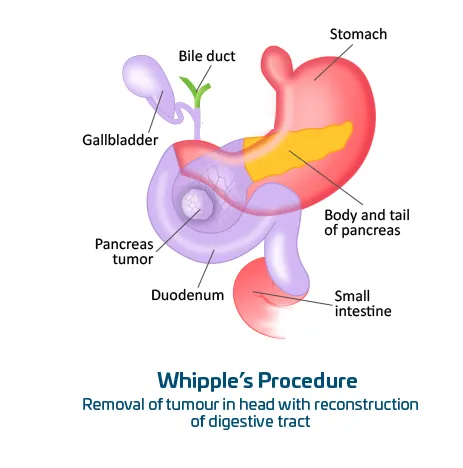
Whipple’s procedure involves removing the head of the pancreas, the duodenum, a portion of the bile duct, and sometimes a portion of the stomach.
It is performed to treat resectable pancreatic cancer, where the tumor is localized and can be surgically removed.
After the removal, the remaining organs are reconnected to restore digestive functions.
The procedure requires a skilled surgical team and is often performed in specialized centers.
Recovery after Whipple’s procedure can take several weeks, and patients may require additional treatments such as chemotherapy or radiation therapy.
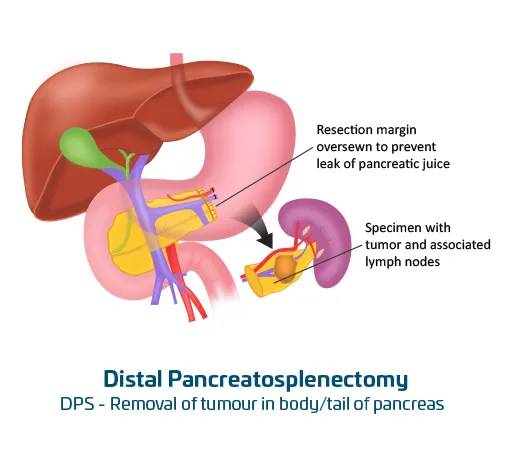
Distal Pancreatosplenectomy involves the removal of the distal (lower) part of the pancreas and the spleen.
It is typically performed when pancreatic cancer is located in the body or tail of the pancreas.
The procedure aims to remove the tumor and any nearby affected tissue.
Distal Pancreatosplenectomy may be performed using minimally invasive techniques such as laparoscopy or robotic-assisted surgery.
After the procedure, patients may require further treatments such as chemotherapy or radiation therapy.
Why Choose Dr. Jitender Singh Chauhan?
Dr. Jitender Singh Chauhan, a highly experienced and skilled GI cancer specialist and surgical oncologist, is based in Ambala Cantt, Haryana, India. Known for his exceptional surgical precision and compassionate patient care, Dr. Chauhan has established himself as a leading expert in gastrointestinal cancer surgeries. His expertise spans across treating complex cases involving liver, stomach, pancreas, and colorectal cancers, positioning him as one of the top oncologists in the region.
Dr. Jitender Singh Chauhan, a highly respected onco surgeon in Haryana, leads a dedicated and expert team at his practice. Working alongside experienced medical oncologists, radiation oncologists, and interventional radiologists, Dr. Jitender Singh Chauhan provides comprehensive care for patients dealing with various cancers.
Dr. Jitender Singh Chauhan, a highly esteemed onco surgeon in Haryana, is renowned for his expertise in managing advanced stages of cancer, including the complex treatment of stage 4 cancers. With a focus on gastrointestinal (GI) cancers, Dr. Chauhan’s practice provides a wide range of cancer care services, including chemotherapy and surgical interventions.
Frequently Asked Questions
A Surgical oncologist or a gastroenterologist specializing in pancreatic diseases is typically the best doctor to consult for pancreatic cancer.
Pancreatic cancer is diagnosed by a team of healthcare professionals, including gastroenterologists, radiologists, pathologists, and oncologists, who analyze the patient’s symptoms, medical history, and perform various tests.
Pancreatic cancer is most curable when it is diagnosed at an early stage (typically stages 0 or I), before it has spread beyond the pancreas. However, even in later stages, treatment options are available to manage symptoms and extend survival.
Stage 4 pancreatic cancer is the most advanced stage of the disease. It means the cancer has spread to distant organs or tissues beyond the pancreas. Treatment at this stage is focused on palliative care to alleviate symptoms and improve the patient’s quality of life.
The first test to evaluate suspected pancreatic cancer is typically an imaging test, such as a computed tomography (CT) scan or an endoscopic ultrasound (EUS), which helps visualize the pancreas and detect any abnormalities.
The best scan to detect cancer depends on the type of cancer and its location. Different scans, such as CT scans, MRI scans, PET scans, and ultrasound, have their strengths and limitations. The choice of scan is determined by the specific needs of the patient and the suspected type of cancer.
Both MRI (magnetic resonance imaging) and CT (computed tomography) scans are valuable imaging techniques used to detect and diagnose cancer. The choice between the two depends on factors such as the type of cancer, location, and specific clinical requirements. In some cases, a combination of both scans may be used for a comprehensive evaluation.
